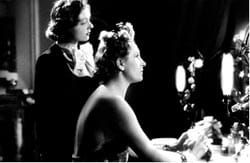 Jean Renoir, son of the famous impressionist painter Pierre-Auguste Renoir, must have been a remarkable child. Growing up in a world overshadowed by such fame and artistic ability as that wielded by his beloved father, one wonders if he ever felt driven to pursue a career outside of the arts, where he'd have a better chance of escaping the inexorable, unflattering comparisons to his famous père.
Jean Renoir, son of the famous impressionist painter Pierre-Auguste Renoir, must have been a remarkable child. Growing up in a world overshadowed by such fame and artistic ability as that wielded by his beloved father, one wonders if he ever felt driven to pursue a career outside of the arts, where he'd have a better chance of escaping the inexorable, unflattering comparisons to his famous père.
Rather than shrinking from the pressures of his father's fame, however, young Renoir pursued his own artistic vision, becoming a film director of such stature and reputation that his works are considered some of the finest ever created.
Now considered an essential entry into any "Greatest Films" conversation, La Règle du jeu ("The Rules of the Game")—Renoir's magnum opus on the self-destructive whims and foibles of the pre-war French Bourgeoisie—was widely panned by French critics and audiences alike when first released, yet its insights are as searing and relevant today as when he first brought them to the screen over seventy years ago.
Drawing inspiration from the comedic works of such French legends as Marivaux, Musset, and Molière, Renoir captures a transformational moment in French history, and weaves a complex, satirical "comedy of manners" around the amorous escapades and misfortunes of the Marquis de la Chesnaye, his wife, Christine, and their various friends and domestics.
As the film opens, the Marquis, Robert, resolves to end a long-time affair to which he has grown increasingly indifferent. Attempting to clear the romantic air, he invites both his paramour and his wife's former lover, André, to a hunting party at his grand summer estate of La Colinière. Accompanying the two pairs of star-crossed lovers is Octave, a faithful friend of both André and Christine who hides his long-unrequited affections for the Marquise under a clownish facade.
Robert's cleverly-orchestrated concoction rapidly boils out of his control. Genevieve, his mistress, refuses to go along with the suggested separation, instead employing her well-honed charms in a last-ditch attempt to win him back. When Christine inadvertently witnesses these efforts, Robert finds himself in an uncomfortable predicament, further complicated by the presence of his wife's former flame, André. A masquerade ball put on by the chateau's staff serves as the bizarre backdrop for the romantic unravelings that ensue: Robert's realization that he is far more attached to his wife than he would ever have admitted in polite company, Octave's eventual declaration of his long-hidden love for Christine and its unexpected consequences, and the violent finale that brings everyone harshly back to earth
In summary form, the story seems sordid, but the way Renoir unspools his characters' various demises is far less vicious than one might expect. Renoir wields his cinematic brush with a master's touch; his extraordinary ability to make audiences love and empathize with his characters while simultaneously hating the declining society and eroding social mores in which they operate makes this a film of deeply antithetical emotions. It is both a stinging critique and a tender eulogy; our disgust with the selfishness and callousness of the film's protagonists is easily matched by our concern for them, and by our pity for their damaged loves and broken lives.
Renoir's satirical intent was clear, though too late to avert the impending doom he foresaw so clearly. His claim that French society as he knew it was "dancing on the edge of a volcano" was roundly criticized at the time, and dissatisfaction over his pessimistic outlook contributed greatly to the film's lack of popularity. All too soon, however, he was proven correct. Within months of the French government's decision to ban the film as "demoralizing" for its portrayal of the vacuous, disconnected upper class, the occupying Nazis upheld the ban, decrying it as "morally perilous." Truly, "no prophet is without honor except in his own country" (Mark 6:4).
Yet the film's most insightful and enduring moments are not limited to the political and social issues that so plagued Renoir's compatriots. It is not his portrayal of the hopelessly unaware Bourgeoisie that most resonates in this Lenten season. Rather, it is his sorrowful recognition of his society's mistaken notion of love that serves as his greatest warning. Renoir's story is a gripping reminder that the Game of Love which occupies his heroes and heroines so completely does indeed have rules.
Love has deep and abiding consequences. No matter how much Robert and Genevieve or Christine and André may attempt to distance themselves from the emotional attachments of their love, they cannot. The forced gaiety and flippancy with which they discuss their once-and-future romances can ill conceal their profound unhappiness. There are no such things as merry flings, no "friends with benefits." We cannot impart our romantic affections without imparting part of our very selves in the process.





